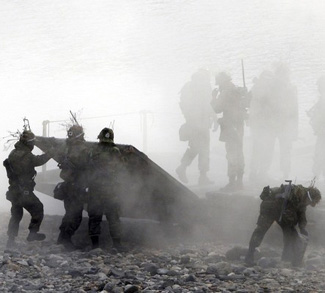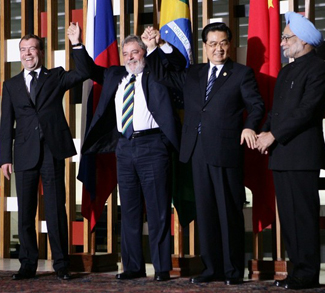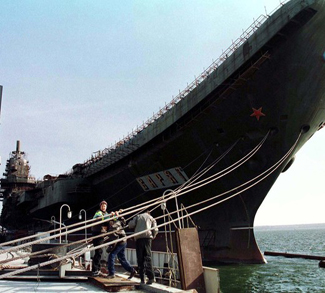FORECAST
In the Democratic People’s Republic of Korea, we find a nuclear-armed state with a collapsing economy and a blurred line of leadership succession. In short, a geopolitical time bomb.
The DPRK has presided over a rapidly-deteriorating political and economic situation for the past few years. The reclusive regime’s second nuclear test had the result of creating a more robust regime of UN sanctions targeted at various sectors of the DPRK economy. While the Kim Jong-Il regime doubtlessly anticipated these new sanctions and assumed they would be able to circumvent them, their scope and severity probably caught them by surprise.
Food shortages, a lack of foreign exchange, and succession questions all drive an increasingly-fragile domestic situation in the nuclear-armed DPRK. Nascent market mechanisms within the North have been crushed in the wake of a clampdown that is part of ongoing efforts to revalue the North Korean won. This clampdown, as well as donor fatigue from countries skeptical about their aid finding its way into the coffers of the North’s nuclear program, have both combined to create fears of a new famine.
UN sanctions have also squeezed out many of Kim Jong-Il’s avenues for producing hard foreign currency; a critical element of government stability. A wide variety of economic activities, ranging from DPRK arms exports to foreign currency remittances from Japan have been stymied by the new sanctions regime.
There are several factors to consider when appraising the potential fallout from the situation within the DPRK. First, it has recently become clear that the DPRK leadership is cognizant of domestic economic instability. Thus, it can be expected that they will consequently be adopting a ‘sunshine’ stance in international dealings in an attempt to restart six-party talks. The goal in these talks will be to lessen economic pressure through the easing of sanctions, and to a lesser degree to seek international legitimacy for the DPRK’s nuclear program.
Even though the North has negotiated in bad faith in six-party talks in the past, it still enjoys a great deal of leverage in any future negotiations. This is mainly due to a simple dynamic: if the international community continues to ignore the North’s nuclear program, it runs the risk of the DPRK expanding its quest for foreign currency into the realm of selling nuclear technologies to terrorists or other non-state entities. In this sense, the United States, Russia, China, Japan, and South Korea are all at a diplomatic disadvantage vis-à-vis the North.
Expect a resumption of six-party talks after an inter-Korean summit that will probably be held sometime in 2010 or early 2011.
While the DPRK has weathered domestic instability in the past, questions over succession and the health of Kim Jong-Il are raising the stakes this time around. The presumed successor to Kim Jong-Il, Kim Jong-Un, is young, inexperienced, and lacks a solid base of support within the DPRK government. If Kim Jong-Il were to die suddenly, cracks would appear in the DPRK leadership, raising the possibility of contingencies ranging from an army takeover to civil war or state collapse. The longer Kim Jong-Il remains alive, the better the chances that Kim Jong-Un can build a solid foundation of support within the DPRK government and guarantee a smooth transition of power.
SUMMARY OF EVENTS: March 15th – March 22nd, 2010
NORTH AMERICA
Mexico
Mexican President Felipe Calderon has called for the United States to share responsibility in the battle against drug traffickers in the two countries.
WESTERN EUROPE
Germany
German Chancellor Angela Merkel has said she wants the eurozone to be able to exclude one of its members in future if it is necessary to avert a crisis.
The United Kingdom
The “disappointing” outcome of December’s climate summit was largely down to “arrogance” on the part of rich countries, according to Lord Stern.
European Union
Europe’s finance ministers have agreed how to help Greece in its battle to control its finances.
EASTERN EUROPE
Russia
US Secretary of State Hillary Clinton says there has been “substantial” progress on a new nuclear disarmament deal with Russia.
MIDDLE EAST
Israel
US Secretary of State Hillary Clinton has called on Israel to make “difficult but necessary choices” if it wants a peace agreement with the Palestinians.
Israeli aircraft attacked at least six targets in the Gaza Strip early today, the day after a rocket fired from the Palestinian enclave killed a Thai worker in Israel as Baroness Ashton of Upholland, the EU’s deputy foreign policy chief, was visiting the blockaded territory.
Inner cabinet meets after Israel reportedly pressured to respond to Washington demands.
Israeli Prime Minister Benjamin Netanyahu has distanced himself from his brother-in-law’s description of US President Barack Obama as anti-Semitic.
The US has said it is awaiting a “formal” response from Israel amid a row over its decision to build 1,600 new homes in occupied East Jerusalem.
Israel’s announcement of plans to build 1,600 homes for Jews in East Jerusalem was “destructive” to peace efforts, a top aide to Barack Obama says.
Iraq
Former Iraqi Prime Minister Ayad Allawi’s bloc has edged ahead of the coalition led by Prime Minister Nuri al-Maliki in Iraq’s parliamentary vote, but al-Maliki remained ahead in the largest provinces, election officials announced Tuesday.
SOUTH ASIA
Pakistan
A key al-Qaeda figure wanted for a deadly attack on a CIA base in Afghanistan has been killed in a US drone strike, US officials believe.
At least eight people were killed and four injured in two suspected US drone strikes in Pakistan’s northwestern tribal district of North Waziristan on Sunday, security officials said.
The UN’s former envoy to Afghanistan, Kai Eide, has strongly criticised Pakistan’s recent arrest of high-ranking Taliban leaders.
Some Pakistan Taliban officials say leaders now meet in secret for fear of US drone strikes. But they vow to keep up their own offensive, as evidenced by a string of bomb attacks last week that killed 70 people.
Afghanistan
A delegation from a powerful Afghan militant group has met officials for talks in Kabul, the government says.
The US has said a new offensive to drive the Taliban from the southern Afghanistan city of Kandahar is under way and will steadily “ramp up” in the months ahead.
The blasts in Lahore are the last desperate measures of pro-Al Qaeda militants who are now being abandoned by the Taliban, diplomatic sources told Dawn.
Saturday’s bomb attacks in the southern Afghan city of Kandahar were a warning to US and Nato forces, the Taliban say.
EAST ASIA
China
US companies feel increasingly unwelcome in China because of what they see as discrimination and inconsistent legal treatment, according to a survey.
North Korea
Tighter international sanctions and a host of domestic problems including chronic food shortages could spark regime collapse in North Korea, an influential think-tank says.
AFRICA
Somalia
Sheikh Daud Ali Hasan, a senior commander of al-Shabab, an armed group fighting to topple Somalia’s government, has been shot dead near Kismayo.
A powerful Sufi Muslim group has joined Somalia’s government to tackle the al-Qaeda-inspired al-Shabab insurgents who control large parts of the country.
Eritrea continued to support last year armed Islamist groups fighting the Somalian government in violation of an arms embargo and new UN sanctions, UN experts concluded in a report.
Nigeria
Nigeria’s acting president, Goodluck Jonathan, has dissolved the country’s cabinet.
Nigeria has recalled its ambassador to Libya after leader Muammar Gaddafi suggested Nigeria be divided into two states – one Christian and one Muslim.




